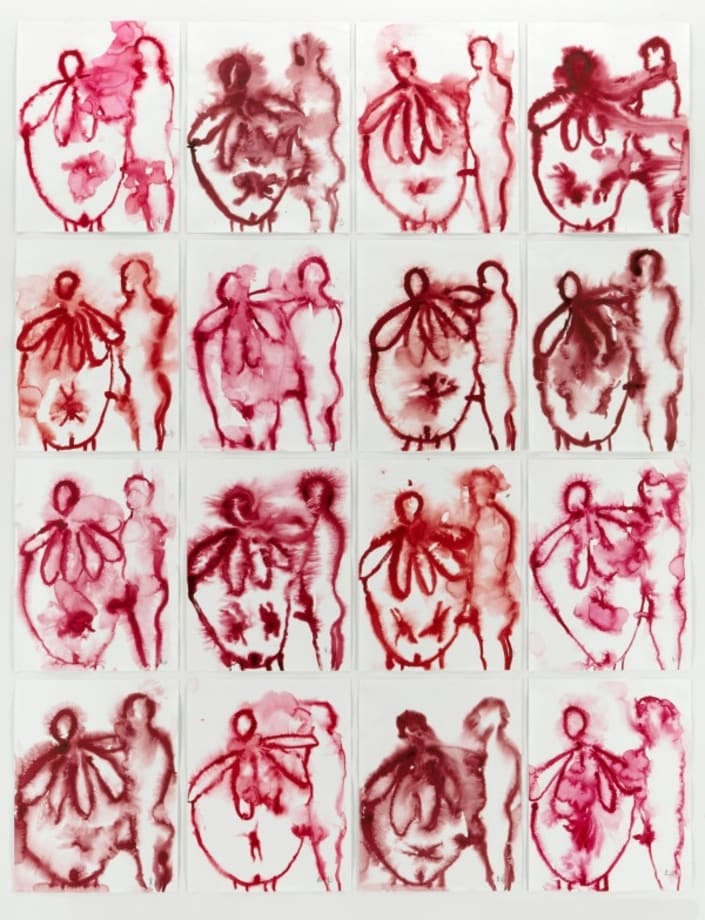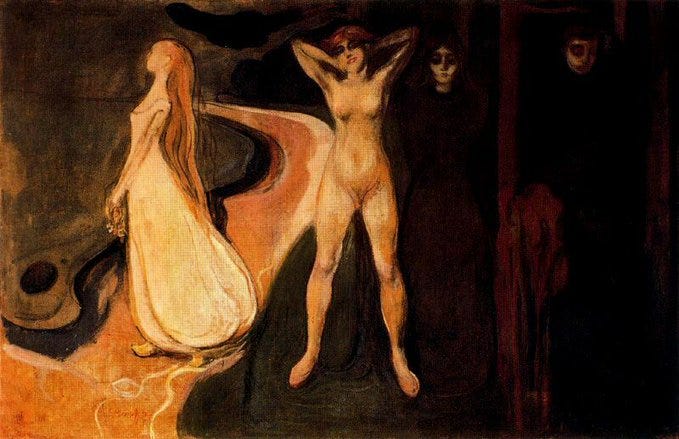I’ve written about this trend before… but there’s more to say about it. Here’s the text of the original post:
I didn’t have a secret life. But I had a secret dream life—which might have been worse. I loved my husband; it’s not that I didn’t. But I felt that he was standing between me and the world, between me and myself.
That’s how Honor Jones opened her viral Atlantic story about the home renovation that turned into a divorce. But curiously, it’s a line that could just as easily appear in many FTM transition stories from older, heterosexually-partnered women—like this one:
It's been a very hard road, not the least coming to terms with needing to transition in the first place… In 2018 my chronic pain flared up so badly that I was stuck in a wheelchair for a few months, barely suppressing the fear that I would never walk again and I would die in middle age destitute and addicted to pain meds. My husband took perfect care of me, and I learned what real love is. When I finally got a diagnosis and proper treatment, it worked so well that I could be nearly pain-free, and I was so grateful to be given a second chance at life. I had new conviction that life was worth living, and so something needed to change. When I realized my gender was the core of so many of my issues at 27, I was afraid of what I would lose by transitioning. But more than that, I was afraid of what I would lose by not transitioning. A therapist helped me understand the meaning of self-love, and from that point I was set on transition. I got divorced, gave up my job to move back to my home country, and moved in with my grandmother. I won't lie, I struggled. Almost a year after leaving, I miss my ex-husband every day.
From the outside, it looks like I've lost everything I had, but it's really the opposite. It was all the price I had to pay to live, and it's worth it. Every little hair on my cheek is worth it, every time I look at porn and jack off is worth it, and every cringey voice crack is worth it.
41, WI, parent, trashfire. February, like someone flipped a switch, I crashed into the deepest trainwreckiest depression imaginable. Totally dysfunctional. I won't even attempt to get into all the feelings, all the components. But the core of this being some kind of gender panic though started to emerge and I didn't really want to accept it because how would I have made it to 41, made it through marriage, made it through having given birth to a child, and not known I was trans. Simultaneously, in reviewing everything that has been or felt wrong with my life, it started to fit pretty well.
So over the following months and in therapy and in talking to people I've basically come to accept I am almost certainly a trans dude, and have been experimenting with social transition, which is tough, tbh, but ultimately feels pretty good although I feel like an imposter in a *different* way than I did before. That's its own separate rant, honestly.
My therapist thinks I should try at least microdosing T, and while I am a person who is crippled doubting my own decisions when they're intractable, I eventually agreed I probably should and got, honestly, pretty damn excited about it.
Fast forward to now: I'm completely done with the life I've lived up until now, desperate to like ... start? honestly? before I'm dead? … I feel so impatient, like I've already wasted my whole life and I'm just desperate, honestly, not to waste any more. I dunno what advice there is to give really but I also have like no community so I could do with some support, I guess.
Read one or two of these stories and you might not make much of it: sometimes, people upend their lives for strange reasons. Read 20 and they all start to sound alike.
Some themes:
Heterosexually-partnered woman between the ages 35-40ish
Almost always white
Self-identified progressive but basically a normie until Trump got elected in 2016 or until May 2020 if a little slow on the uptake
Reports a generally decent marriage with a supportive husband
Announces sudden Internet-rabbithole-inspired 'epiphany' (usually during COVID lockdown)
Adopts very public (often downright exhibitionist) "queer" identity that grows like a hothouse plant, overtaking everything, until the woman finally comes out as trans
Dismantles relationship and life to chase testosterone, grow a patchy beard, and “jack off” to porn (a.k.a. become your 'true self')
There’s also a ‘lite’ version where you can keep your husband/mortgage/dining-room set/breasts. You can just change your pronouns to she/they or they/them.
In the nonbinary case, the social opportunism tends to be striking. What began as loud and proud self-effacing allyship starts to chafe, particularly when that someone is at heart fairly self-centered and attention-seeking. Forget “Karen.” Come out as nonbinary and you get your voice back. If you’ve drunk enough of the gender Kool-Aid, you may even believe that the label “nonbinary” really fits and that ‘woman’/‘mother’/‘wife’ really doesn’t.
But I’m being glib. Let’s go back to the women who take it all the way. The plotlines may be all too predictable but their predicaments are serious. I don’t think anyone goes down this road who doesn’t have a problem that they don’t know how to live with. The names we give these problems and the templates for action keep changing. Where would these women have found meaning and direction 20, 40, 100 years ago? Would divorce and a new career have cut it? Or would they have drifted through diagnostic fads that paint fresh words over old wounds and vague discontents? In 1990, would they spent their Saturdays at recovered-memory support groups, excavating an invented past?
Their stories boil over with alternative explanations: There are women who endured traumatic pregnancies or who don’t feel particularly ‘maternal.’ There are deaths in the family—parents usually—and mortality edges closer. There are serious, often unexplained illnesses. Family histories of breast and ovarian cancer crop up a lot. There’s shapeless discontent. Maybe they’re having trouble letting go of an identity—something to do with youth, precocity, unrealized potential (ask me how I know!)—as life consumes itself.
While you can observe themes in these women’s backgrounds (progressive credentials, midlife status, fanfic-reading and -writing), their stories show great individual variation right up until the point when they acquire a radical set of new beliefs about gender. It’s only once they come out as trans that they all start to sound the same. In this sense, they’re little different than their much younger sisters, who seize on trans identity when they hit puberty. But at 13, you’re meant to question everything. It’s the responsibility of the grownups in your life to protect you from inexorability. At 40, it’s much harder to tear life down to its foundations. And you’re the grownup. Nothing and no one can stop you.
Trans identification always has a meaning and always serves some purpose: Help me understand why I’ve never fit in anywhere, with anyone. Don’t see me like that. Don’t remind me of those things. Tell me you’re proud of me.
So what might trans identity mean to these women and what purposes might such a revelation serve in their lives?
Many of these women write about relationships they cannot justify leaving: good men, loving husbands, attentive fathers (“My husband took perfect care of me, and I learned what real love is”). But there is some itch left unscratched, or perhaps something false in the telling. Trans identity becomes a youth-recapturing, relationship-extraction strategy. Does trans identity give such women a guilt-free way out of marriages that feel oppressive or stifling? There are so many comments like "Well, my husband is straight [M attracted to F] and I'm gay [F attracted to M] so it could never have worked out..."? Does it let women set boundaries (hard to do years into a relationship, particularly when marriage and motherhood let boundaries slip)? Does it let them say: You don't know me, I'm not what I appear to be?
Or perhaps the problem has more to do with running out of plot, living past the end of the story we write all over young women even now, no matter how many women resist: love, marriage, children, oblivion. Or—if not oblivion—invisibility. The spotlight swings away. What now? Many women move past the end of the mythology that surrounds youth, beauty, and romantic drama and find meaning elsewhere quite naturally. But others struggle. Life becomes a broad, flat, sunless plain stretching bleakly to the horizon. A change of plot is necessary. One can’t possibly go on without adopting a new story.
Whatever a woman in this situation lands on next will serve some hidden purpose. Whatever revelations may surface will hint at something else, something deeper, something that shies from language and so seizes whatever is at hand. Such a woman writes “I'm completely done with the life I've lived up until now, desperate to like ... start? honestly? before I'm dead?” Thus women end up, again and again, flocking to religious revivals, new-age epiphanies, new diagnoses and new lifestyles to fit. Something’s wrong, but the problem and the ‘solution’ won’t match. This will matter, but only later. At first, a fresh plotline suffices, wherever it leads.
Keep reading with a 7-day free trial
Subscribe to gender:hacked by Eliza Mondegreen to keep reading this post and get 7 days of free access to the full post archives.





